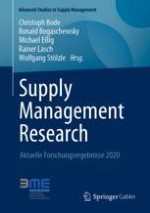2020 | Buch
Supply Management Research
Aktuelle Forschungsergebnisse 2020
herausgegeben von: Prof. Dr. Christoph Bode, Prof. Dr. Ronald Bogaschewsky, Prof. Dr. Michael Eßig, Prof. Dr. Rainer Lasch, Prof. Dr. Wolfgang Stölzle
Verlag: Springer Fachmedien Wiesbaden
Buchreihe : Advanced Studies in Supply Management
